10 Best No-Glow Trail Cameras of 2025 – Reviews & Guide
Last Updated on
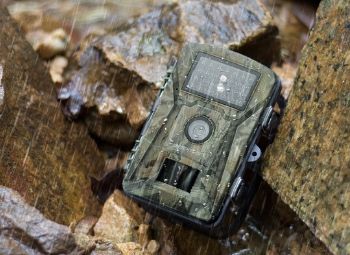
We also need to blend in with the environment, being as subtle as the trees and bushes.
We did a little hunting of our own and scoped out the best no glow trail camera so you can survey your land when it’s sunny or rainy, day or night. We’re confident that these reviews will help you find the perfect no-glow camera for your hunting purposes.

A Quick Comparison of our Favorites in 2025
| Image | Product | Details | ||
|---|---|---|---|---|
| Best Overall |
 |
Stealth Cam |
|
CHECK PRICE |
| Best Value |
 |
Meidase SL122 |
|
CHECK PRICE |
| Premium Choice |
 |
Stealth Cam G42NG |
|
CHECK PRICE |
 |
Campark T70 |
|
CHECK PRICE | |
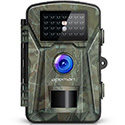 |
APEMAN H45 |
|
CHECK PRICE |
The 10 Best No-Glow Trail Cameras
1. Stealth Cam No-Glow Trail Camera – Best Overall
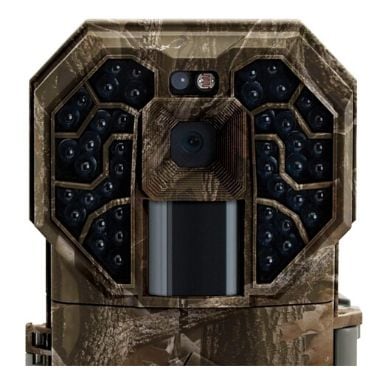
If you don’t feel like sitting in a bush in the dark for months at a time, then the Stealth Cam has you covered for up to 100 feet, with sound, and is our top pick for the best no-glow trail camera. While this is known as one of the better daytime cameras, you’ll be pleased with the quality of the photos at night as well. The battery can last up to eight months, and if you throw a 32 GB flash drive in there, you can continuously take pictures for that amount of time too. That’s wild tracking power.
It’s also durable as all heck. This model can handle very low temps (think around -25 degrees), high winds, rain, etc. The programming is completely customizable, so you can have it taking pictures at various times of the day as determined by you. This product also packs a punch with an impressive 14 megapixels and four different resolution settings.
All in all, we think that this is the best no-glow trail camera on the market.
- 100-foot recording capability
- No light emitted at all
- Eight-month standby battery life
- Durable
- Looks scary
2. Meidase SL122 Trail Camera – Best Value
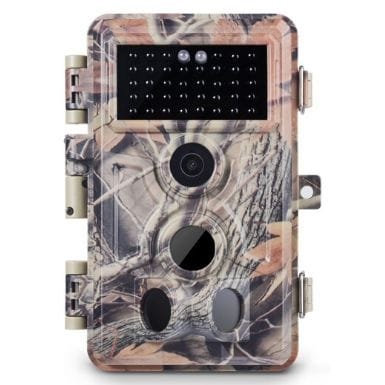
You won’t get quite the distance out of this camera as with our top pick, but 65 feet is nothing to scoff at. When you consider all the specs of this product, it’s not hard to see why we consider it the best no-glow trail camera for the money. It shoots with 16 megapixels, is password-protected, has a battery life up to six months (depending on usage), is waterproof, and has high-performance night vision. The Meidase SL122 also features a timer for automatically taking pictures when you are not around and a time-lapse option, so you can go through your footage a bit easier after leaving it out in the woods for a few weeks. With three sensitivity levels, you can choose how detailed your results are. This product works with AA batteries, and we’re pretty impressed with the battery life.
To drive the point home when it comes to value, most people think this is one of those “too good to be true” items because of the price compared to similar offerings, but they generally come away pleasantly surprised. It should be noted that this may be more water resistant than waterproof.
- 65-foot tracking distance
- Password protected
- Six-month battery life
- Not exactly waterproof
3. Stealth Cam G42NG Trail Camera – Premium Choice
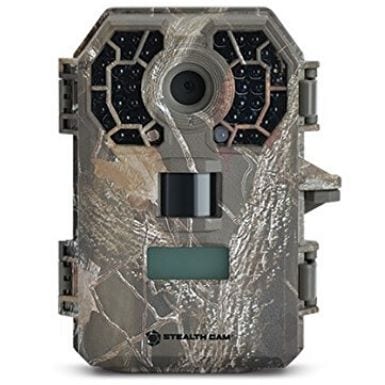
The aptly named Stealth Cam makes up in stealthiness what it may lack in some of the features of our first two products. It shoots 1080P with 10-pixel capability and has a user friendly interface. Where this product really shines is that it makes absolutely no noise and has absolutely zero flash, making it perfect for not spooking the animals you are tracking.
SIDE BONUS: Because of the quiet and perfectly dark nature of this product, it makes a wonderful security camera!
With a half-second reflex trigger, this camera has a burst mode that can take up to nine pictures at a time. The SD card slot is compatible with anything up to 32 GB of memory, so you’ll have plenty of room for pictures or videos, though it is believed that it is most compatible with SanDisk or PNY. It is not compatible with micro-card and adapter — yes, it will still capture pictures and videos, but they will be very grainy. Speaking of video, this can take up to 180 seconds of HD video at a time with full audio. The trick here is that if you use batteries and SD cards of a lower quality, it will definitely show in this product, but if you use the highest quality SD cards and batteries, this camera can stand out as one of the best.
- No flash, no camera click
- .5 reflex
- 180 seconds of HD video
- Not micro-card compatible
- Must use highest quality SD card/batteries
4. Campark T70 No-Glow Trail Game Cameras
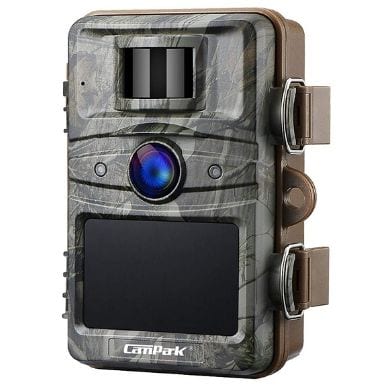
With a waterproof rating of IP66, we can already tell that this camera is serious. With a rating like this, this product can withstand being left out in the dustiest of deserts or even the soaked conditions of the rainforest. While on standby, the battery life of this camera can last up to six months. With a threaded mount, you can put this camera wherever you want. As for viewing the results, you’ll have to buy an adapter, but once you have it, you’ll be able to view your videos or pictures anywhere.
While this does shoot at night, it is a bit disappointing compared to the other products on this list. There is video playback on the provided screen, but we recommend buying an adapter so you can get a more clear view of the pictures/videos taken. Sometimes this camera will randomly stop taking pictures, but it is most likely a battery issue. Change those out and you are good to go. That being said, there are durability and consistency issues with this product. If this camera gives you trouble for any reason, there is a one-year money-back guarantee.
- IP66 waterproof rating
- Threaded mount
- Video playback on screen
- Grainy night pictures
- Durability concerns
5. APEMAN H45 No Glow Trail Camera
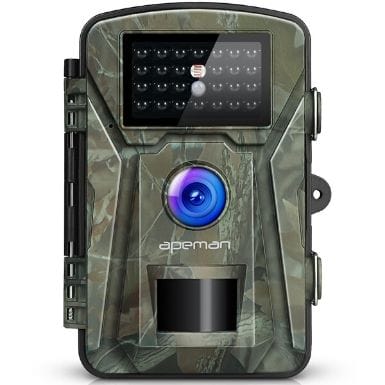
This product from APEMAN is another value buy and a worthy one at that. Taking pictures with 16-megapixel quality and in 1080P, this camera can capture pictures with the best of them. While the trigger speed is a little slow, it still boasts a good 65 feet of distance with the flash and has night-time slowing effects so it can better capture what you are looking for. It comes with an IP66 rating, which means it should be able to hold up in most environments. APEMAN has redesigned their no-glow camera to allow for less condensation inside the unit. This product also comes with everything you need for a successful day on the range, including a wall mount, a mounting belt, and a USB cable so you can view your pictures and videos on other devices. This camera is not to be used for continuous recording, but more for motion detection. You will not capture any sound with this device.
The manufacturer recommends that you use a class 6 or above 32GB flashcard and 1.5V AA batteries. Rechargeable batteries are not recommended and could cause some functions to act sporadically or not at all.
Setup with this camera is not exactly easy, and from what we understand, the support staff is not the best at helping. While there is plenty of good to be said about this product, it does not come without its frustrations. Fortunately, if you have issues, it comes standard with a one-year warranty or there is an option to buy a three-year warranty.
- 1080P display
- Less condensation in unit
- One-year warranty
- Difficult setup
- Inconsistent support staff
6. Victure Trail Game Camera
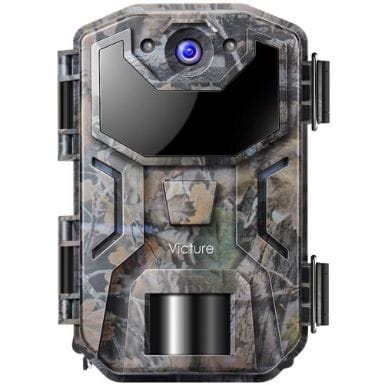
Of all the cameras we’ve reviewed so far, this one has the fastest picture triggering at .3 seconds, which is .2 seconds faster than industry standard. That might not sound like a lot, but when you consider that it is almost twice as fast as most of the competition, you have to take notice. This camera shoots at 20 megapixels with 1080P technology. Because of the new clamshell design, this product will take on no residual water, so you can be confident in the photos you are taking. As opposed to other products on this list, this camera is not IP66 rated, so that gives us a bit of pause, even though it is advertised as waterproof. When taking pictures, it makes a bit of noise, and there is, even if barely, a noticeable flash. This is evidenced by animals looking directly at the camera when the picture is being taken. Cute but not practical.
This is another product where we advise that you use the best batteries and the best SD card. There have also been consistency issues with shipping. Instructions for setup are included but confusing to follow. If you are having issues with your camera, this comes with 12 free months of product service.
- .3 trigger time
- 20 megapixels
- Hard to set up
- Noticeable flash
7. usogood TC20 Trail Camera
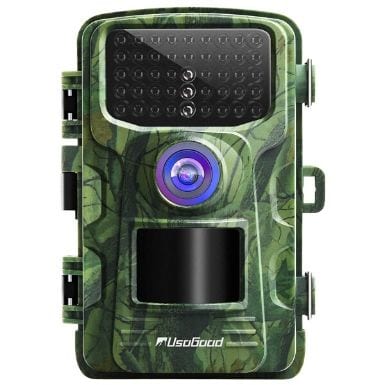
With 60mm-thick waterproof housing, the usogood boasts an IP66 rating and can be used in pretty much any condition. With a trigger response time of .2 seconds, this becomes the fastest reacting camera on our list. This item comes complete with a CMOS sensor, adding just a little extra panache to your photos in the clarity department. Storing pictures in JPEG formats and videos in AVI, you’ll be able to view the product of your lack of labor with a 2.4-inch TFT-LCD screen. You can also zoom in four times to get really close to what you are tracking. At 2.75 pounds, this is one of the heavier items on this list, but you can mount it onto a tripod. In time-lapse mode, at its fastest setting, you can get 25 FPS. This product requires eight AA batteries and a class 10, 32 GB Micro SD card, which are not included.
Setting this camera up is not easy. The instructions are confusing and not intuitive in the least. They also don’t mention that a 32 GB micro-card is required. The photo quality of night-time photos is less than ideal. While the support staff claims to be attentive, there is no mention of a warranty or guarantee anywhere that we can find.
- .2 trigger time
- Good time-lapse mode
- Heavy
- Not intuitive
- Poor night-time photo quality
8. Sesern 859494 Trail Camera

What jumps out most about the Sesern 859494 is the range that this product gets. With 120 degrees of viewing capability, this camera can capture images from 80 feet out during the day and 65 feet out during the night. The 16-megapixel capturing capability and 1080P viewing technology aren’t unique but still very nice. It also holds up to extreme temperatures, advertised as being able to withstand elements as frigid as -4 degrees Fahrenheit and as scorching as 160 degrees. While this does not offer continuous videotaping, it will trigger within .2 seconds of detection.
Sadly, you might only get pictures for about .2 seconds. This camera emits a noticeable light when taking pictures. The battery life seems to be inconsistent, with complaints ranging from three weeks of life all the way down to one day. The photo quality seems to be inconsistent as well. If you wind up having issues, the Sesern comes with a one-year warranty.
- Good range
- Holds up to extreme temperatures
- Very noticeable light
- Poor battery life
- Poor photo quality
9. BLAZEVIDEO Game & Trail Camera

All the specs of this camera look good: 20 megapixel camera displaying at 1080P, with an IP66 rating, and able to capture images at 82 feet. So, why is this at #9? For starters, it can capture pictures from 82 feet … as long as it is 77 degrees Fahrenheit or cooler, so this camera isn’t exactly made to withstand the elements. The trigger time looks good, .2 seconds at its fastest, but it also might be .6 seconds, which is on the slow end compared to other cameras. This camera requires eight AA batteries and an SD card for use. It only records video, and there is no programmable timer.
The quality of the photos is definitely not the best, but it does seem to be a pretty durable product.
- 82-foot range
- Inconsistent trigger
- Poor photo quality
- Does not handle poor weather well
10. Olymbros T3 Trail Game Camera
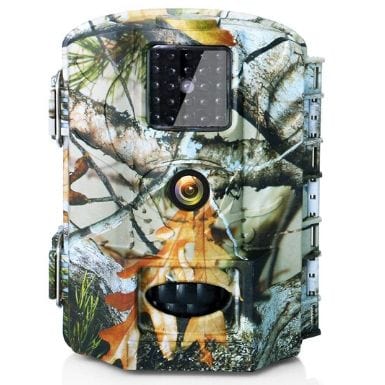
Closing out our ranking is the Olymbros T3 Trail Game Camera. This camera has the longest trigger time of any of the cameras on this list and a pretty tropical-looking casing. This product has an IP65 rating, but it does shoot with 16 megapixels with a 1080P display and has a long battery life. Saving your pictures may be difficult, however; this camera frequently has a hard time recognizing SD cards.
With an already slow trigger speed, we think that the advertising may be a bit misleading and it actually takes a little longer than .6 seconds. For some reason, this camera drains batteries even when turned off. Other than that, it is a pretty average product. The night pictures are fine. For the price, you won’t be too disappointed, though we think there are better products at this price point.
- 1080P display
- Long trigger time
- IP65 rating
- Sometimes does not recognize SD cards
Related Read: 10 Best Trail Cameras – Reviews & Top Picks

Buyers Guide: Choosing the Best No-Glow Trail Camera
Having the best no-glow trail camera can be crucial to your success in hunting, so how do you know what is right for you? There are several aspects to consider when shopping.
The trigger time.
Whether you get a shot of your game depends on the trigger time of your camera. Half a second is standard, while some can be practically instantaneous at .2 seconds. The trigger time is the amount of time between when the camera detects an object moving and when it snaps the picture or starts taking video.
Does it emit light?
Even though these are all classified as no-glow cameras, some are a little more or a little less no-glow than others. While the light emitted won’t be glaring on any of these, animals like deer are more sensitive to light than humans, and some of these cameras do emit light that may not be detectable to us but is to them. Some cameras use a flash once they detect an animal. Again, it isn’t a bright flash, but it can still spook your game.
What about sound?
When it comes to the click of the picture, not all no-glow cameras are the same. While not as alarming as a light, the sound of the click can alert your targets that something is up and even spook them. You’ll want to check to see how noisy your prospective purchase is before buying.
Waterproof or water-resistant?
Seeing as you’ll probably be leaving your camera out for a good amount of time, you can expect it to get rained on a bit. We recommend looking for no-glow cameras that at least have a water resistance rating of IP66. This means that the product is dust-tight and very water-resistant.
Warranty.
Some products are more durable than others, but even the most durable ones can break down in extreme conditions. Make sure to check up on warranties before buying.

Conclusion:
We understand that buying a no-glow camera might be one of the more important decisions when it comes to your hunting expeditions. We also know that it is hard to pinpoint exactly what you need.
With the overall functionality of the Stealth Cam or just the overall value that a product like the Meidase has, we are confident that these reviews of the best no glow trail cameras will steer you in the right direction.
Looking for trail cameras?
- Check out these trail cameras that can add another layer of security to your home
- Need a wireless/cellular trail camera – See our recommendations!
Table of Contents
- A Quick Comparison of our Favorites in 2025
- The 10 Best No-Glow Trail Cameras
- 1. Stealth Cam No-Glow Trail Camera – Best Overall
- 2. Meidase SL122 Trail Camera – Best Value
- 3. Stealth Cam G42NG Trail Camera – Premium Choice
- 4. Campark T70 No-Glow Trail Game Cameras
- 5. APEMAN H45 No Glow Trail Camera
- 6. Victure Trail Game Camera
- 7. usogood TC20 Trail Camera
- 8. Sesern 859494 Trail Camera
- 9. BLAZEVIDEO Game & Trail Camera
- 10. Olymbros T3 Trail Game Camera
- Buyers Guide: Choosing the Best No-Glow Trail Camera
- Conclusion:
About the Author Robert Sparks
Robert’s obsession with all things optical started early in life, when his optician father would bring home prototypes for Robert to play with. Nowadays, Robert is dedicated to helping others find the right optics for their needs. His hobbies include astronomy, astrophysics, and model building. Originally from Newark, NJ, he resides in Santa Fe, New Mexico, where the nighttime skies are filled with glittering stars.
Related Articles:
Binocular Magnification Chart: Numbers & Distances Compared
What Is the Best Binocular Magnification for Hunting? Optical Features Explained
When Were Binoculars Invented? History, Today & Future
How to Choose Binoculars for Bird Watching: 10 Expert Tips
How to Clean a Refractor Telescope: Step-by-Step Guide
How to Clean a Telescope Eyepiece: Step-by-Step Guide
How to Clean a Rifle Scope: 8 Expert Tips
Monocular vs Telescope: Differences Explained (With Pictures)



